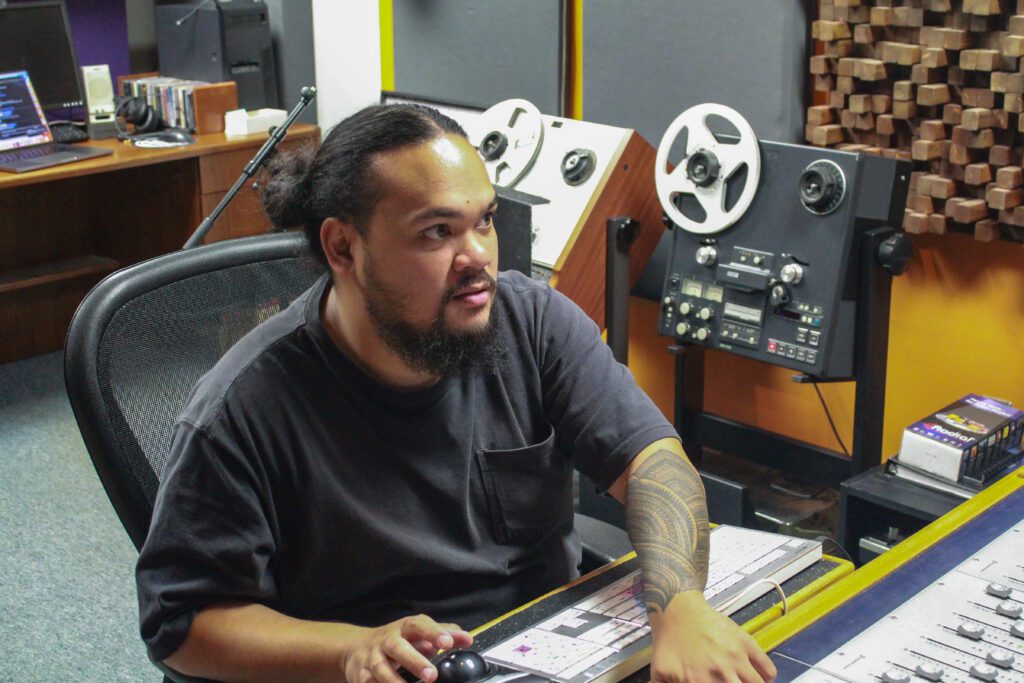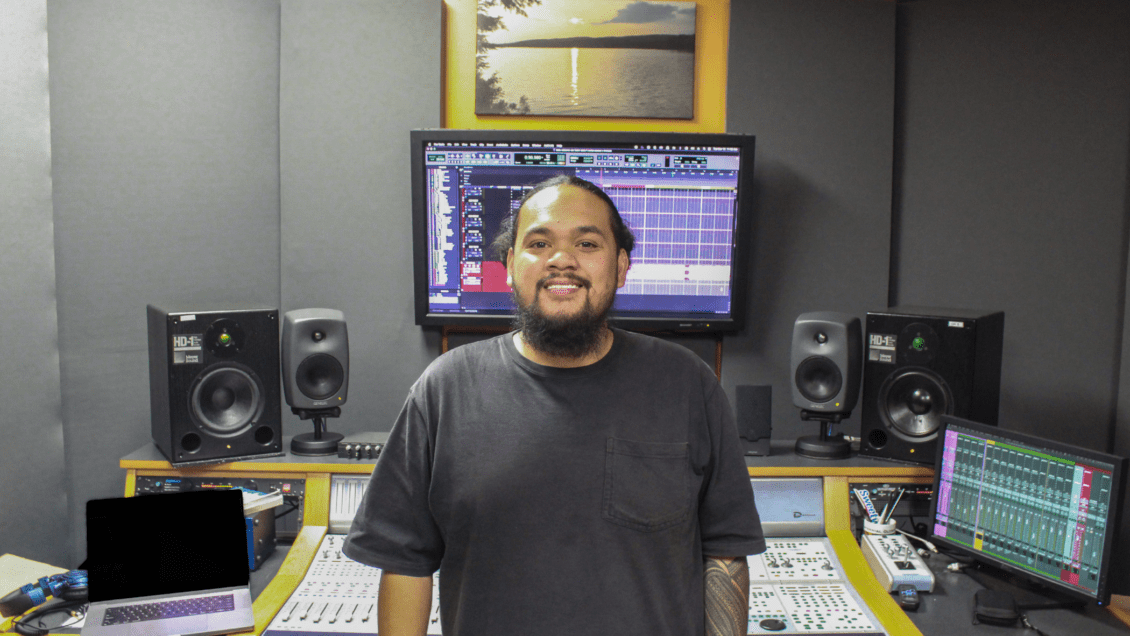Melvin Villaver is far from his roots in sunny Southern California, but he’s come to feel at home in Clemson. The last year has been a whirlwind for the new assistant professor of Global Black Studies and Audio Technology.
He successfully defended his Ph.D. dissertation at Purdue University based on the independent production of a mixtape in August. Villaver arrived at Clemson University a week later. The achievement made him the first in his family to obtain a Ph.D. He is the son of Filipino immigrants who departed their homeland in pursuit of a better life in the United States, aiming to provide their children with an education in American academic institutions. Now, as a new faculty member, Villaver is actively establishing a fully equipped Hip Hop studio within the Brooks Center for the Performing Arts, providing students with a dedicated space for training in music production.
Global Black Studies director L. Kaifa Roland said Villaver’s impact has been evident in his first semester.
“Dr. Villaver has provided an infusion of good energy and joy to the Global Black Studies program. Our students were quickly drawn to the courses he is teaching on Hip Hop and Black American music, and his dynamism in the classroom is sure to be a magnet for both programs alike. I believe he is a game-changer. I am excited for the Clemson community to get to know him as an artist, a scholar and a colleague.”
Clemson News spoke with Villaver about his research and what he brings to the University community. The interview has been edited for length and clarity.
Clemson News: What was your upbringing?
Melvin Villaver: “I was born and raised in Los Angeles, California, and I lived in L.A. for the first 27 years of my life. I’m a lifelong musician, so not only did I grow up playing the piano because my mother kept the piano in the house and enrolled me in lessons as early as I was 5 years old, but I also studied music from adolescence on through college. My parents worked long hours, sometimes working on the opposite sides of the city from our neighborhood. They would have to commute as many as two hours. It took a lot of sacrifice. They had the courage to support me in pursuing music and believed it would amount to something.
“As a teenager, I would take public transportation or get my parents to drop me off at local Black-owned Hip Hop recording studios.That’s where I really learned how to get involved with audio technology. After I graduated in 2014 with my undergraduate degree from the University of Southern California, I worked as a professional musician for three years. It was an excellent time of my life. I got to travel, tour, perform and do a lot of amazing things. But there are certain things folks don’t tell you about the music industry, like that there’s no health insurance. It’s a cutthroat industry. I made a semi-sacrificial decision to quit my band and go to graduate school.”
CN: How did Clemson University get on your radar?
MV: “A.D. Carson ’17 (Ph.D. in Rhetorics, Communication and Information Design) went on record as the first ever scholar to turn in a Hip Hop mixtape as his dissertation. Ironically enough, I followed a Clemson graduate student’s trail that he blazed by turning in a Hip Hop mixtape for my dissertation, ‘Harmonic Resurgence: Reclaiming the Godino Twins Journey Through Hip Hop.’ It was a speculative fiction/archival support project on conjoined Filipino jazz musicians popular in the 1920s. They had been seemingly erased from the archives.

“I applied for the job in the fall of 2022 and had been tapped on the shoulder by a couple of mentors to apply for this job. ‘Melvin, this job has you written all over it,’ someone told me. ‘They’re looking for somebody with expertise in cultural studies and someone who could teach a Global Black Studies pedagogy but with audio tech experience.’ Well, I’ve got 25 years of it.”
CN: How has this transition been for you?
MV: “Being a public face on this campus where students feel they can relate to and feel safe in my classes is an honor and a privilege I don’t take for granted. It’s a dream come true. I’m adjusting to the rigor that goes into being a professor and the logistical and administrative duties I’ve taken on. I’m trying to put courses on Hip Hop on the books that have never been created. This is my dream job, serving the students at Clemson.
“I’m coming from a very, very different place in Los Angeles and Purdue. People here are so welcoming. Clemson students are truly special. I feel like there’s something special in the hills here. The people here have a genuine desire and hunger for more and I relate to that. I’m trying to retire here, emeritus. What I love about Clemson is that I’m in a role that’s the first of its kind. I have a chance to make my mark.”
CN: Who are two of your favorite artists right now?
MV: “I’m an L.A. homer. He passed away in 2019, but he’s still somebody I listen to every day because I worked in the periphery of him, and I met him numerous times throughout my apprenticeship of L.A. studios. He has had a tremendous impact on my philosophy, business practice and how I approach professorship – that’s Nipsey Hussle. That man stood for what I stand for as far as economic empowerment, not only for the Black community but for everyone. Kendrick Lamar is another proud Los Angeleno and has impacted people on a visceral level and challenges people to think outside the box.”
Get in touch and we will connect you with the author or another expert.
Or email us at news@clemson.edu

